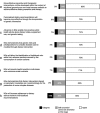Risks of nutrigenomics and nutrigenetics? What the scientists say
- PMID: 24293399
- PMCID: PMC3896617
- DOI: 10.1007/s12263-013-0370-6
Risks of nutrigenomics and nutrigenetics? What the scientists say
Abstract
Nutrigenomics and nutrigenetics (hereafter NGx) have stimulated expectations for beneficial applications in public health and individuals. Yet, the potential achievability of such promise is not without socioethical considerations that challenge NGx implementation. This paper focuses on the opinions of NGx researchers about potential risks raised by NGx. The results of an online survey show that these researchers (n = 126) are fairly confident about the potential benefits of NGx, and that most downplay its potential risks. Researchers in this field do not believe that NGx will reconfigure foods as medication or transform the conception of eating into a health hazard. The majority think that NGx will produce no added burden on individuals to get tested or to remain compliant with NGx recommendations, nor that NGx will threaten individual autonomy in daily food choice. The majority of researchers do not think that NGx will lead to discrimination against and/or stigmatization of people who do not comply with NGx dietary recommendations. Despite this optimism among NGx researchers, we suggest that key risk factors raised by the socioethical context in which NGx applications will be implemented need to be considered.
Figures


Similar articles
-
Benefits associated with nutrigenomics research and their reporting in the scientific literature: researchers' perspectives.Account Res. 2013;20(3):167-83. doi: 10.1080/08989621.2013.788381. Account Res. 2013. PMID: 23672589
-
Ethical considerations in the implementation of nutrigenetics/nutrigenomics.Per Med. 2017 Jan;14(1):75-83. doi: 10.2217/pme-2016-0035. Epub 2016 Nov 30. Per Med. 2017. PMID: 29749825
-
Evaluation of a cartoon-based knowledge dissemination intervention on scientific and ethical challenges raised by nutrigenomics/nutrigenetics research.Eval Program Plann. 2014 Oct;46:103-14. doi: 10.1016/j.evalprogplan.2014.06.002. Epub 2014 Jun 14. Eval Program Plann. 2014. PMID: 24973757
-
Nutrigenetics and nutrigenomics: viewpoints on the current status and applications in nutrition research and practice.J Nutrigenet Nutrigenomics. 2011;4(2):69-89. doi: 10.1159/000327772. Epub 2011 May 28. J Nutrigenet Nutrigenomics. 2011. PMID: 21625170 Free PMC article. Review.
-
[Nutrigenetics, nutrigenomics and Mediterranean diet: a new vision for gastronomy].Nutr Hosp. 2018 Jun 12;35(Spec No4):19-27. doi: 10.20960/nh.2120. Nutr Hosp. 2018. PMID: 30070117 Review. Spanish.
Cited by
-
Consumer acceptance of genetic-based personalized nutrition in Hungary.Genes Nutr. 2021 Mar 1;16(1):3. doi: 10.1186/s12263-021-00683-7. Genes Nutr. 2021. PMID: 33648454 Free PMC article.
-
Epigenetic effects of human breast milk.Nutrients. 2014 Apr 24;6(4):1711-24. doi: 10.3390/nu6041711. Nutrients. 2014. PMID: 24763114 Free PMC article. Review.
-
Consumer adoption of personalised nutrition services from the perspective of a risk-benefit trade-off.Genes Nutr. 2015 Nov;10(6):42. doi: 10.1007/s12263-015-0478-y. Epub 2015 Sep 25. Genes Nutr. 2015. PMID: 26407608 Free PMC article.
-
Psychological determinants of consumer acceptance of personalised nutrition in 9 European countries.PLoS One. 2014 Oct 21;9(10):e110614. doi: 10.1371/journal.pone.0110614. eCollection 2014. PLoS One. 2014. PMID: 25334009 Free PMC article.
-
Personalised nutrition and health.BMJ. 2018 Jun 13;361:bmj.k2173. doi: 10.1136/bmj.k2173. BMJ. 2018. PMID: 29898881 Free PMC article. Review.
References
LinkOut - more resources
Full Text Sources
Other Literature Sources

